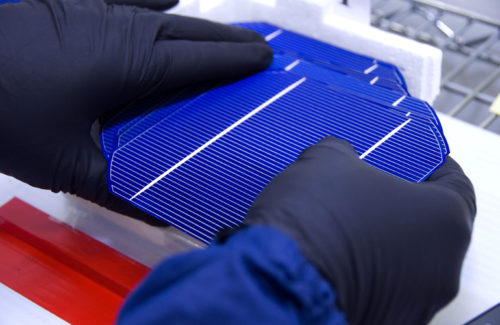
Solar panel manufacturing is on center stage yet again as another antidumping investigation begins and domestic manufacturing legislation remains in purgatory. Archive photo from the Oregon Department of Transportation: https://www.flickr.com/photos/oregondot/
North Carolina net-metering compromise now up for debate
Raleigh, North Carolina
An agreement among solar advocacy groups and Duke Energy on a new net-metering program at the end of 2021 is now back on the negotiating table after a group of 15 North Carolina solar installers wrote an objection to state regulators, according to WFAE. North Carolina’s attorney general called for postponing the plan until regulators can conduct further analysis.
NREL, UL working on first cybersecurity standard for distributed energy resources
Washington, D.C.
The National Renewable Energy Laboratory partnered with UL to develop cybersecurity standards for distributed energy resources, which are at risk for hacks. The new comprehensive certification requirements would apply to energy storage and PV inverters on the distribution grid.
Solar advocates stage live “phone-in” during March CPUC meeting
Sacramento, California
During the California Public Utilities Commission’s March voting meeting, solar advocates waited on hold for more than five hours to express their objections to the commission’s proposed decision on net metering. Despite the hours of public comments, the topic wasn’t on the agenda for the meeting.
New York becomes first state to surpass 1 GW of community solar installed
Albany, New York
Gov. Kathy Hochul announced that New York became the first state to surpass 1 GW of community solar installations, with this market making up 70% of total solar installations across the state in 2021. NYSERDA says New York also has the largest community solar pipeline in the nation.
Sen. Markey introduces bill that would require transmission planning to accommodate clean energy
Washington, D.C.
Sen. Edward Markey (D-MA) introduced the Connecting Hard-to-reach Areas with Renewably Generated Energy (CHARGE) Act, which would encourage the country to proactively plan for a grid that can accommodate distributed generation sources. The bill would make decarbonization goals a priority in grid planning.
Solar manufacturers urge Congress to pass tax incentives to boost U.S. industry
Washington, D.C.
Over 100 manufacturers across the solar supply chain sent a letter to President Joe Biden and other leaders asking for long-term clean energy tax incentives in federal budget reconciliation legislation. The group says incentives would help grow existing production and lead to investments in domestic manufacturing.
Commerce will investigate alleged AD/CVD circumvention by Chinese solar panel companies in Southeast Asia
Washington, D.C.
The Dept. of Commerce announced it will investigate the claim that Chinese solar panel manufacturers have moved portions of their manufacturing operations to Southeast Asia as a way to circumvent antidumping and countervailing (AD/CV) duties. The investigation is in response to a petition filed in February by California-based solar panel assembler Auxin Solar.





A watchdog is exactly what the smallest rate payer needs! A publication and a lobbyist funded by donations to a non profit political action committee through the publication would be the way!
Any activists in need of a job out there?
“The National Renewable Energy Laboratory partnered with UL to develop cybersecurity standards for distributed energy resources, which are at risk for hacks. The new comprehensive certification requirements would apply to energy storage and PV inverters on the distribution grid.”
This has been a problem with distributed command and control systems and the reason for the advent and application of the SCADA system, (Supervisory Control And Data Acquisition). There is a term used and a concept in SCADA, it is basically a question: “Where do you want your (overhead) to be handled?” Basically, many RTU, PCU end controllers have “loss of communications” and emergency control override of a local asset. IF one has a distributed grid with many aggregated microgrids, it would be wise to have a microgrid able to fall back into “islanded” operations mode until the problem is fixed.
“During the California Public Utilities Commission’s March voting meeting, solar advocates waited on hold for more than five hours to express their objections to the commission’s proposed decision on net metering. Despite the hours of public comments, the topic wasn’t on the agenda for the meeting.”
This is actually great news. The ratepayers and solar PV industry is keenly aware of how the CPUC has been infiltrated by the “will” of the IOU electric utilities. When YOU watch them and call them out, they get nervous and hope kicking the can down the road, will allow a lull in attention and they can push their agenda through and into ruling passage, before the public realizes what has happened. The neat thing about the public comment section of a public meeting. (IF) the public will, is ignored, a lawsuit can be filed to abrogate the ruling in the name of the consumer. So, five hours of verbal comments can become a sledgehammer on an unfair, Gerrymandered ruling for the utilities and against the ratepayers.